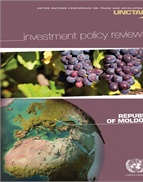Moldova, Republic of
In the 1990s, the Republic of Moldova experienced one of the largest and longest-lasting losses of productive capacities among transition economies. An economic recovery started in the early 2000s and continued throughout the decade, largely fuelled by migrants' remittances and an expanding services sector. To create the bases for sustainable development, the Government aims at promoting export-oriented production and at better exploiting the country's potential as a natural transit point between East and West.
For this to happen, a large injection of investment is required in the country's infrastructure and human capital, which goes beyond local financing capacity.
Thus far, foreign direct investment (FDI) has played a minor role as, outside of privatization, it has been limited to small and medium-sized projects.
The Government is keen to attract more FDI to transform the economy into an export platform and regional logistics hub. In this regard, this IPR proposes an investment strategy with general and specific measures to improve the investment environment and to derive more developmental benefits from FDI.
The regulatory framework for investment is conducive to business and generally follows international practices. Most laws comply with European Union standards and institutions required for regulating and administering business in a modern market economy have been set up.
Nevertheless, the country does not yet distance itself from its competitors with regard to ease of doing business, public administration and regulations.
The comprehensive investment strategy proposed by the IPR consists of five main elements:
1. Making FDI a policy priority for sustainable development
2. Enhancing human resources and physical infrastructure through and for better FDI
3. Achieving excellence in regulating and administering investment for sustainable development
4. Increasing the effectiveness of investment promotion for increased FDI benefits
5. Tapping into the country's FDI potential in selected areas
Investment Policy Review of South-East Europe
The Investment Policy Review (IPR) of South-East Europe (SEE) is the first regional IPR undertaken by UNCTAD. It covers seven economies: Albania, Bosnia and Herzegovina, Montenegro, the Republic of Moldova,* Serbia, the Former Yugoslav Republic of Macedonia and Kosovo.**
The IPR analyses, based on the UNCTAD Investment Policy Framework for Sustainable Development (IPFSD), key features of the national and international policy environment affecting investment, including entry, treatment and protection, procedures to establish a business, fiscal policy and investment incentives, labour market and skills, competition regime as well as regional investment promotion initiatives. For each area, a set of concrete recommendations to improve the investment environment and foster impact is provided.
The review emphasizes regional cooperation in pursuing improved investment policy and promotion practices to achieve a joint strategic goal: attract increased levels of investment that contribute to the social and economic development of SEE economies, in line with the objectives set in the SEE 2020 Strategy.
This regional IPR represents a practical contribution to achieving this objective and further strengthening the ties of cooperation and interdependence within the region. It also complements parallel regional mechanisms, namely the "Berlin Process" that addresses infrastructure and economic cooperation.
Through the efforts of the Regional Cooperation Council Secretariat, CEFTA Secretariat and UNCTAD, this IPR has already brought the economies of the region into closer collaboration with each other.
The recommendations of this report will inform the Regional Investment Policy and Promotion Programme, which will address the priorities of the regional investment reform agenda, aiming at regional harmonization of investment policies with a view to increase transparency, attract higher investment and allow SEE economies to move towards EU standards and regulations.
The follow-up programme will be implemented under the auspices of the RCC Secretariat, with technical support of the World Bank Group / IFC, financial support of the European Commission, and in close cooperation with the CEFTA and UNCTAD.
(*) As a participant to the SEE Investment Committee's Working Group on Investments and Central European Free Trade Agreement (CEFTA) Signatory, at the request of the CEFTA and Regional Cooperation Council Secretariats, the Republic of Moldova is also included in the regional study, even though it is not directly encompassed by the SEE 2020 Strategy.
(**) United Nations Administrative Region, Security Council resolution 1244 (1999).
Download Investment Policy Review















